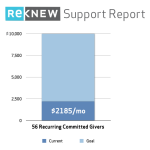We run our website the way we wished the whole internet worked: we provide high quality original content with no ads. We are funded solely by your direct support. Please consider supporting this project.

How to Overcome the Flesh Mindset
Unless you have taken intentional steps to change, the way you presently experience yourself and the world around you was mostly chosen for you, not by you.
Think about that. You inherited a way of interpreting the world. Your brain has been in the process of becoming programmed by factors outside your control from the moment you were born. Your parents, friends, culture, media, and life experiences all played a part in this programming, much of which has undoubtedly been true and beneficial, but much of which has been untrue and unhelpful.
One of the reasons ReKnew was created was to help people take intentional steps to change, to “re-think” how we interpret the world, God, ourselves, and others. As the ReKnew Manifesto states, “ReKnew exists to encourage believers and skeptics alike to re-think things they thought they already knew.”
In all probability most of our thinking has been developed by viewing and experiencing the world as though God was not present. In other words, most of the programming gave us a mind that is “set on the flesh” and conformed to the pattern of this world” (Romans 8:6-7; 12:2). We’ve been conditioned to have a “flesh-mindset” that habitually pushes God out of our awareness moment-by-moment.
What is particularly insidious about the flesh-mindset is that it largely operates without our knowing it. Once a program is installed, it becomes part of your brain’s autopilot. You don’t have to think about the way you experience yourself and the world. It just happens.
For example, you don’t have to think about the meaning of each word you’re reading right now because your brain automatically associates each group of letters with a meaning, according to its programming. The brain uses this same autopilot to give meaning to everything.
To the extent that we remain in bondage to the flesh-mindset, we will not fully experience the forgiveness, new nature, and abundant Life God has given us. We will, to some extent, experience and live our lives as though we were not forgiven, did not have a new nature, and were not given abundant Life. So long as we remain subservient to out brainwashing in the flesh-mindset, the way we experience ourselves and the world will be largely determined by whomever or whatever programmed us.
Regardless of what we believe, it’s our preprogrammed flesh-mindset that determines how we experience the world and how we live moment-by-moment—if we allow it. We believe in God and his Kingdom, but as slaves to our preprogrammed flesh-mindset, most of the moments that comprise our actual life are spent thinking, feeling, and acting as through God and his Kingdom are not real.
The Bible calls this “double-mindedness” (James 1:8). No amount of resolutions, sermons, Bible studies, self-help books, or conferences will rectify this situation if they just provide us with more information. There is only one thing to be done, as James says, and that is to submit ourselves to God—not just intellectually, theoretically, or abstractly, but to do so in the now, in this moment.
We only have the now to submit to God. This is to become single-minded. Whatever else is going on—whether we’re taking a shower, engaging in a discussion, watching television, or reading a blog—we must try to remain conscious, anchored in the present.
When we can experience all of life against the backdrop of God’s ever present love, moment-by-moment, it makes us single-minded. Every moment we remain aware of, and submitted to, God’s presence becomes a Kingdom moment, for it is defined by the reign of God. In these moments we are defined by God rather than whomever or whatever programmed us. In these moments Christ is our actual Lord rather than whomever or whatever programmed us. In these moments we are truly free rather than pathetic slaves who are mindlessly “conformed to the pattern of this world.”
—Adapted from Present Perfect, pages 84-90
Image by Moyan_Brenn via Flickr
Category: General
Tags: Flesh, Kingdom Living, Practicing the Presence of God, ReKnew
Related Reading

Taking the Lord’s Name in Vain
These things need to stop as it relates to our faith and our politics. Image by Katie Tegtmeyer. Sourced via Flickr.

Racism: Why Whites have Trouble “Getting It”
I’m a member of a special task group on racial reconciliation that consists of a dozen or so pastors from around the Twin Cities. We’ve been meeting periodically for the past year or so in order to strategize how to help the Church of the Twin Cities as a whole move forward in racial reconciliation.…

Welcome to the New ReKnew!
Say hello to the new and much-improved ReKnew website! Not only have we upgraded the look, feel, and functionality of our site (e.g. our new search engine frankly rocks!), we’ve added – and will continue to add – new content. For example, because I am frequently asked what books I’d recommend on various topics, I…

The Cost of Holding On
Given Greg’s recent Twitter comments on the question of how we view what we own, we thought this article in the New York Times was particularly timely. What is the cost of holding onto things? As we accumulate more and more possessions, do we pay a price beyond the actual price tag? Although this piece…

Fundraiser Update
THANK YOU SO MUCH to those of you who have contributed to this ministry. This is such a great start and we’re feeling very grateful! Here’s where we’re at today: 56 monthly supporters $4810 in one-time gifts $2185 monthly budget We’re keeping this fundraiser going through the end of the year and we’re hoping…

Beyond Theoretical Salvation
Profession of Christ’s lordship in our lives isn’t a magical formula. It’s more than a theory about how we can get saved if we confess the right doctrines. The confession has meaning only when it’s understood to be a genuine pledge to surrender one’s life to Christ. (See yesterday’s post.) But I want us to…
